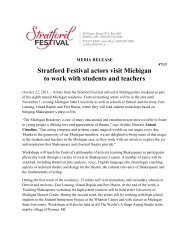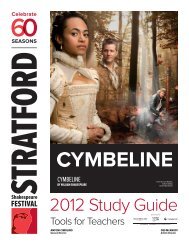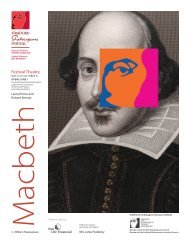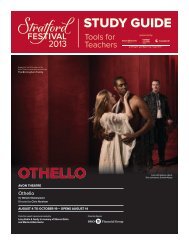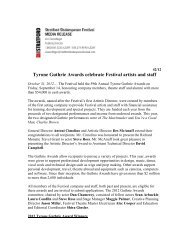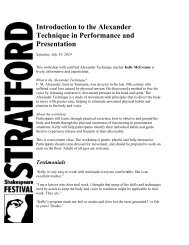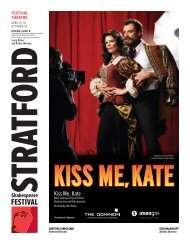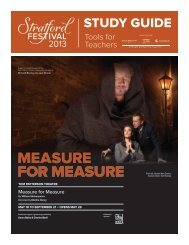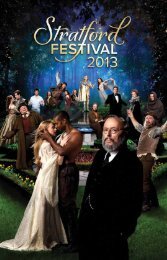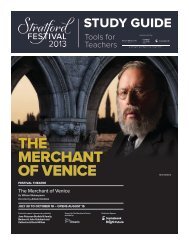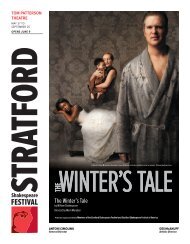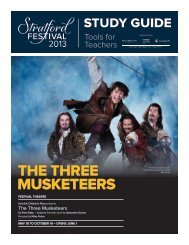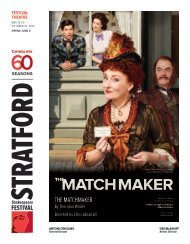Cyrano Cover.indd - Stratford Festival
Cyrano Cover.indd - Stratford Festival
Cyrano Cover.indd - Stratford Festival
You also want an ePaper? Increase the reach of your titles
YUMPU automatically turns print PDFs into web optimized ePapers that Google loves.
the opening scene, which tellingly takes place ina theatre. This cleverly allows Rostand to thumbhis nose at the theatrical status quo of 1640 byportraying Richelieu as a literary scavenger, whosesurrogate offers his services as a “collaborator” to<strong>Cyrano</strong>, in order to strengthen the Cardinal’s ownreputation as un homme de lettres.Rostand’s triumph was all the more unexpected asthe theatrical landscape of late 19th-century Francewas dominated by comédies de boulevard as wellas the two dramatic products of the Industrial Age:Naturalism and Symbolism.Naturalism, with its focus on “thesis plays,” regardedthe stage as a trenchant vehicle to engendersocial reform, anticipating the agitprop theatre ofthe 20th century. The issues dramatized by wellmeaningplaywrights included political and legalcorruption, the subjugation of women, the misuseof science, and sexual mores. While Naturalism wasinitially hailed for presenting individuals rather thantypes, the art of the dramatist ultimately becamesecondary to the message; plays became polemicsrather than engaging pieces of theatre.The period also gave rise to the Symbolistmovement, typified by the work of the Belgianplaywright Maurice Maeterlinck. A reactionagainst Naturalism’s sometimes heavy-handedattempts at social reform, Symbolism examined thehuman condition through works that were highlymetaphorical and suggestive.It therefore seemed unlikely that a publicfascinated with technology and the moderne(a trend that would reach its apogee at theExposition Universelle in Paris in 1900) wouldembrace a play featuring an all-but-forgotten figurefrom the 17th century.A writer, soldier, philosopher and raconteur,the real <strong>Cyrano</strong> de Bergerac was born into adistinguished Parisian family and raised in northernFrance. Although he certainly served alongsideGascons, he was not a Gascon himself, a fact Rostandneatly ignores. The playwright also invents the lovetriangle involving Roxane, <strong>Cyrano</strong> and the handsomebut verbally challenged Christian. Even the nose thatdefines the fictional <strong>Cyrano</strong>’s sense of self was, inreality, described as large but hardly freakish. Whenhis half-truths and anachronisms were pointed out,Rostand claimed that a poet was not a historian andstated that he had the artistic right to be “inexact onpurpose.” This part-fictitious, larger-than-life character3



